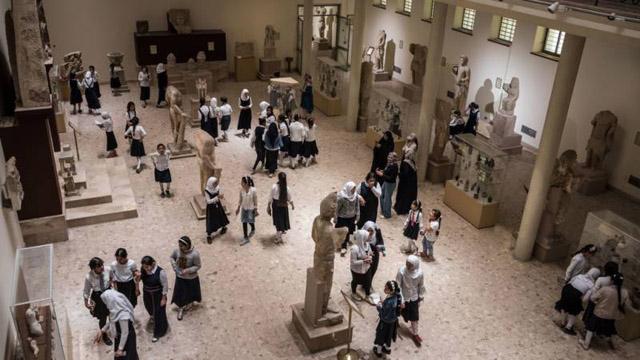- International News
- Sun-2021-01-10 | 03:18 pm

Nayrouz News Agency :
An imposing house stands out among other buildings in Iraq’s Samawah city — once a multi-generational family home, it’s now a museum of a bygone age in the country’s tribal south.
Abdellatif Al Jablawi, the property’s owner and family patriarch, led a tour of the traditional house where he was born 80 years ago.
At the time, three generations, from grandparents to grandchildren, lived in the house, with its intricate "shanasheel” bay windows, wooden balconies and tall doors topped by elaborate lintels.
"Over the generations, everyone preferred to rent elsewhere and the house emptied out,” said Jablawi, now the oldest member of his family.
The house is comprised of 13 rooms splashed with sunlight coloured by stained glass windows, including a grand ceremonial salon and kitchen, which Jablawi still calls "the fireplace”, as it was known when he was young.
The rooms are connected by steep, narrow stairs and walls of yellow brick, a historic building material still produced in southern Iraq.
Jablawi said the structure had been at risk of "falling into ruin” when he decided to act.
"I decided to buy back all the shares of the house... and, in 2015, I found an architect specialised in renovating heritage buildings,” he said.
"I told myself: ‘This is our loyalty to the past’.”
All told, the work to restore the building cost 250 million dinars, or around $171,000.
‘Symbol of the city’
At the start, some family members were resistant to the project, said Ali, Jablawi’s eldest son, standing in front of an old radio set in the inner courtyard, where a well recalls the days before running water.
"We didn’t agree with this project and the expense; we suggested he sell the dilapidated house to construct a building because we are in the commercial centre of the city,” he added.
Jablawi categorically rejected this proposal, and his stubborn commitment to the plan eventually convinced the rest of his family.
"The house has become a symbol of the city and it is open to everyone, so we understood that our father was right,” Ali said as he walked along the balcony that overlooks the inner courtyard.
The antiquities directorate in Muthanna province, one of Iraq’s poorest, only provides logistical support in protecting heritage sites "when necessary”, one of the directorate’s officials Mustafa Al Ghazi told AFP.
Before the novel coronavirus pandemic, the house regularly hosted cultural events and other evenings of poetry or music among carved wooden chests, carpets and cushions arrayed on the floor for family or tribal gatherings.
In 2020, the house was the subject of a documentary, titled "The Soul of Samawah” — an honour for its proud owne













